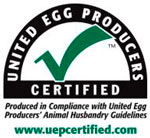Animal welfare claims on egg cartons are currently unregulated in the United States, enabling the United Egg Producers (UEP) to mislead consumers with exaggerated and false claims, according to a statement by Erica Meier, executive director of Compassion Over Killing. The animal rights group is calling attention to the egg cartons currently in grocery stores in the U.S. that show a variety of images of happy hens roaming around outside to claims such as "animal-friendly."
More than 95% of eggs sold in the U.S., they say, come from birds confined in wire battery cages so small that they can barely move, and among the most egregious claims found on cartons of confined birds, is the designation, "certified animal care."
COK claims that Land 'O Lakes (LOL), the parent company of MOARK, LLC, is dragging its heels over removing an "Animal Care Certified" logo on its egg crates. Non-removal of this logo is in violation of an agreement the egg industry made with the Federal Trade Commission (FTC), after the national Better Business Bureau deemed the phrase "Animal Care Certified" to be misleading to consumers because it conveyed a false message of animal care. The agreement was made in September 2005 that would end the logo's use by April 1, 2006.
What gripes the COK is that the old logo is still appearing on images of cartons on LOL's website. They also can prove that the logo was found on cartons of "Daisy Fresh," a MOARK brand purchased in 2006 and most recently on January 13, 2007 (with a "sell by" date of February 22, 2007) at the Family Market on N. Neosho Blvd., Neosho.
"Both of these situations clearly represent not only a violation of the FTC agreement to no longer advertise “Animal Care Certified” after April 1, 2006, but further suggest that MOARK is openly flaunting the FTC’s agreement with the UEP." Cheryl Leahy, general counsel for COK wrote on March 13, 2007, to Craig Willardson, CEO of MOARK, LLC, headquartered in Chesterfield, MO.
Leahy wrote:
Additionally, on MOARK's website, the UEP standards are referred to as "Animal Care Certification Guidelines" http://www.moarkllc.com/pagefiles/faq.html (print out enclosed). This is effectively the same claim as “Animal Care Certified.” The rationale relied upon by the FTC was that the “certification” program for the care of animals did not meet consumer expectations of humane treatment of animals. Merely changing the form of one of the words to represent this as “Animal Care Certification” does not absolve MOARK of its responsibility not to mislead consumers.
MOARK's website further states that the UEP standards are an "Animal Welfare Guidelines Certification Program." For similar reasons as mentioned above regarding the misleading “Animal Care Certification Guidelines,” this claim must, too, be removed from the website. A “certified” animal treatment program that claims to protect welfare implies that it is a humane certification program. That is exactly the perception the FTC found misleading.

The original logo has been replaced on most egg crates by a logo with a green check bearing the words, "United Egg Producers Certified," which only means that MOARK, an original member of United Egg Producers, and other members are certifying their own eggs.
The industry continues to oppose any attempts to further clarify how its hens are raised. "Asking the industry to regulate itself is like asking a fox to guard the henhouse," Meier said.






Comments